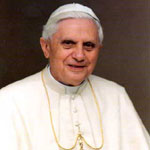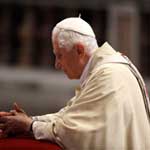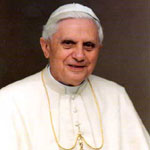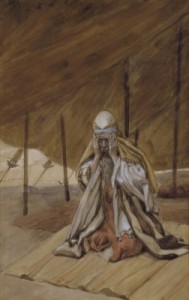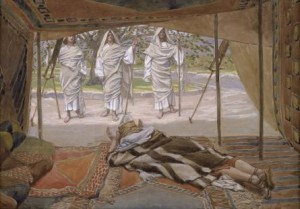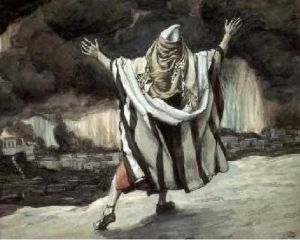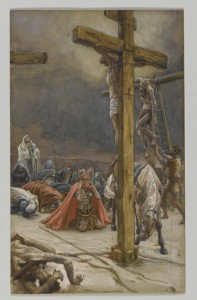VATICAN CITY, 19 OCT 2011 (VIS) –
Some 20,000 pilgrims attended Benedict XVI’s general audience, which was held this morning in St. Peter’s Square. Continuing a series of catecheses dedicated to the Psalms, the Holy Father focused his attention on Psalm 136, “a great hymn of praise which celebrates the Lord in the many and repeated manifestations of His goodness down human history”.
The Pope explained how, in Jewish tradition, this Psalm is sung at the end of the Passover supper, and therefore it was probably also pronounced by Jesus at the last Passover He celebrated with His disciples. The text enumerates God’s many interventions in favour of His people “and each proclamation of a salvific action by the Lord is answered by an antiphon reiterating the main cause for praise: God’s eternal love, a love which, according to the Hebrew term used, implies faithfulness, mercy, goodness, grace and tenderness”.
God is first presented as “He Who ‘does great wonders’, first among them that of the creation: heaven, earth and stars. … With the creation the Lord shows Himself in all His goodness and beauty. He commits Himself to life, revealing a desire for good whence all other salvific actions arise”.
The Psalm goes on to consider God’s manifestations in history, evoking the great moment when the Israelites were freed from slavery in Egypt. The forty years of wandering in the desert were “a decisive period for Israel which, allowing itself to be guided by the Lord, learned to live on faith, obedient and docile to the laws of God. Those were difficult years, marked by the harshness of life in the desert, but also a happy time of confidence and filial trust in the Lord”.
“The history of Israel has known exhilarating moments of joy, of fullness of life, of awareness of the presence of God and His salvation”, said the Pope. “But it has also been marked by episodes of sin, painful periods of darkness and profound affliction. Many were the adversaries from whom the Lord liberated His people”. The Psalm speaks of these events, in particular the Babylonian exile and the destruction of Jerusalem, “when it seemed that Israel had lost everything, even its own identity, even its trust in the Lord. However, God remembers, and frees. The salvation of Israel and of all mankind is bound to the Lord’s faithfulness, to His memory. While man forgets easily, God remains faithful: His memory is a precious casket containing that ‘love which endures forever’ about which our Psalm speaks”.
The Psalm concludes by reminding us that God feeds His creatures, “caring for life and giving
bread. … In the fullness of time the Son of God became man to give life, for the salvation of each one of us; and He continues to gives Himself as bread in the mystery of the Eucharist, so as to draw us into His covenant, which makes us children. So great is God’s merciful goodness, the sublimity of His ‘love which endures forever'”. In conclusion the Pope read a quote from the First Letter of St. John, advising the faithful to bear it in mind in their prayers: “See what love the Father has given us, that that we should be called children of God; and that is what we are”.
AG/ VIS 20111019 (560)
raise the Lord, for he is good: for his mercy endures for ever.
2 Praise the God of gods: for his mercy endures for ever.
3 Praise the Lord of lords: for his mercy endures for ever.
4 Who alone does great wonders: for his mercy endures for ever.
5 Who made the heavens in understanding: for his mercy endures for ever.
6 Who established the earth above the waters: for his mercy endures for ever.
7 Who made the great lights: for his mercy endures for ever.
8 The sun to rule the day: for his mercy endures for ever.
9 The moon and the stars to rule the night: for his mercy endures for ever.
10 Who smote Egypt with their firstborn: for his mercy endures for ever.
11 Who brought out Israel from among them: for his mercy endures for ever.
12 With a mighty hand and with a stretched out arm: for his mercy endures for ever.
13 Who divided the Red Sea into parts: for his mercy endures for ever.
14 And brought out Israel through the midst thereof: for his mercy endures for ever.
15 And overthrew Pharao and his host in the Red Sea: for his mercy endures for ever.
16 Who led his people through the desert: for his mercy endures for ever.
17 Who smote great kings: for his mercy endures for ever.
18 And slew strong kings: for his mercy endures for ever.
19 Sehon king of the Amorrhites: for his mercy endures for ever.
20 And Og king of Basan: for his mercy endures for ever.
21 And he gave their land for an inheritance: for his mercy endures for ever.
22 For an inheritance to his servant Israel: for his mercy endures for ever.
23 For he was mindful of us in our affliction: for his mercy endures for ever.
24 And he redeemed us from our enemies: for his mercy endures for ever.
25 Who gives food to all flesh: for his mercy endures for ever.
26 Give glory to the God of heaven: for his mercy endures for ever. Give glory to the Lord of lords: for his mercy endures for ever.
Pope Benedict on Prayer
Pope Benedict on Prayer 11 – Psalm 126: “May those who sow in tears, reap with shouts of joy”
HUMAN HISTORY IS A HISTORY OF SALVATION – Psalm 126
VATICAN CITY, OCT. 12, 2011 (Zenit.org).- Here is a translation of the Italian-language catechesis Benedict XVI gave today during the general audience held in St. Peter’s Square. The Pope today continued his catecheses on prayer with a reflection on Psalm 126.
* * *
In the previous catecheses, we have meditated on a number of psalms of lament and of trust. Today, I would like to reflect with you on a notably joyous psalm, a prayer that sings with joy the marvels of God. It is Psalm 126 — according to Greco-Latin numbering, 125 — which extols the great things the Lord has done with His people, and which He continues to do with every believer.
The psalmist begins the prayer in the name of all Israel by recalling the thrilling experience of salvation:
“When the Lord restored the fortunes of Zion,
we were like those who dream.
Then our mouth was filled with laughter,
and our tongue with shouts of joy” (Verses 1-2a).
The psalm speaks of “restored fortunes”; that is, restored to their original state in all their former favorability. It begins then with a situation of suffering and of need to which God responds by bringing about salvation and restoring the man who prays to his former condition; indeed, one that is enriched and even changed for the better. This is what happens to Job, when the Lord restores to him all that he had lost, redoubling it and bestowing upon him an even greater blessing (cf. Job 42:10-13), and this is what the people of Israel experience in returning to their homeland after the Babylonian exile.
This psalm is meant to be interpreted with reference to the end of the deportation to a foreign land: The expression “restore the fortunes of Zion” is read and understood by the tradition as a “return of the prisoners of Zion.” In fact, the return from exile is paradigmatic of every divine and saving intervention, since the fall of Jerusalem and the deportation into Babylon were devastating experiences for the Chosen People, not only on the political and social planes, but also and especially on the religious and spiritual ones. The loss of their land, the end of the davidic monarchy and the destruction of the Temple appear as a denial of the divine promises, and the People of the Covenant, dispersed among the pagans, painfully question a God who seems to have abandoned them.
Therefore, the end of the deportation and their return to their homeland are experienced as a marvelous return to faith, to trust, to communion with the Lord; it is a “restoring of fortunes” that involves a conversion of heart, forgiveness, re-found friendship with God, knowledge of His mercy and a renewed possibility of praising Him (cf. Jeremiah 29:12-14; 30:18-20; 33:6-11; Ezekiel 39:25-29). It is an experience of overflowing joy, of laughter and of cries of jubilation, so beautiful that “it seems like a dream.” Divine help often takes surprising forms that surpass what man is able to imagine; hence the wonder and joy that are expressed in this psalm: “The Lord has done great things.” This is what the nations said, and it is what Israel proclaims:
“Then they said among the nations,
‘the Lord has done great things for them.’
The Lord has done great things for us;
we are glad” (Verses 2b-3).
God performs marvelous works in the history of men. In carrying out salvation, He reveals Himself
to all as the powerful and merciful Lord, a refuge for the oppressed, who does not forget the cry of the poor (cf. Psalm 9:10,13), who loves justice and right and of whose love the earth is filled (cf. Psalm 33:5). Thus, standing before the liberation of the People of Israel, all the nations recognize the great and marvelous things God has accomplished for His People, and they celebrate the Lord in His reality as Savior.
And Israel echoes the proclamation of the nations, taking it up and repeating it once more — but as the protagonist — as a direct recipient of the divine action: “The Lord has done great things for us”; “for us” or even more precisely, “with us,” in hebrew ‘immanû, thus affirming that privileged relationship that the Lord keeps with His chosen ones, and which is found in the nameEmmanuel, “God with us,” the name by which Jesus would be called, His complete and full revelation (cf. Matthew 1:23).
Dear brothers and sisters, in our prayer we should look more often at how, in the events of our own lives, the Lord has protected, guided and helped us, and we should praise Him for all He has done and does for us. We should be more attentive to the good things the Lord gives to us. We are always attentive to problems and to difficulties, and we are almost unwilling to perceive that there are beautiful things that come from the Lord. This attention, which becomes gratitude, is very important for us; it creates in us a memory for the good and it helps us also in times of darkness. God accomplishes great things, and whoever experiences this — attentive to the Lord’s goodness with an attentiveness of heart — is filled with joy. The first part of the psalm concludes on this joyous note. To be saved and to return to one’s homeland from exile are like being returned to life: Freedom opens up to laughter, but is does so together with a waiting for a fulfillment still desired and implored. This is the second part of our psalm, which continues:
Pope Benedict on Prayer 10 – God serves as Shepherd for people throughout history
Psalm 23 – Vatican.va
Turning to the Lord in prayer implies a radical act of trust, in the awareness that one is entrusting oneself to God who is good, “merciful and gracious, slow to anger, and abounding in steadfast love and faithfulness” (Ex 34:6-7; Ps 86[85]:15; cf. Joel 2:13; Jon 4:2; Ps 103 [102]:8; 145[144]:8; Neh 9:17). For this reason I would like to reflect with you today on a Psalm that is totally imbued with trust, in which the Psalmist expresses his serene certainty that he is guided and protected, safe from every danger, because the Lord is his Shepherd. It is Psalm 23 [22, according to the Greco-Latin numbering], a text familiar to all and loved by all.
“The Lord is my shepherd, I shall not want”: the beautiful prayer begins with these words, evoking the nomadic environment of sheep-farming and the experience of familiarity between the shepherd and the sheep that make up his little flock. The image calls to mind an atmosphere of trust, intimacy and tenderness: the shepherd knows each one of his sheep and calls them by name; and they follow him because they recognize him and trust in him (cf. Jn 10:2-4).
He tends them, looks after them as precious possessions, ready to defend them, to guarantee their well-being and enable them to live a peaceful life. They can lack nothing as long as the shepherd is with them. The Psalmist refers to this experience by calling God his shepherd and letting God lead him to safe pastures: “He makes me lie down in green pastures. He leads me beside still waters; he restores my soul. He leads me in paths of righteousness for his name’s sake” (Ps 23[22]:2-3).
The vision that unfolds before our eyes is that of green pastures and springs of clear water, oases of peace to which the shepherd leads his flock, symbols of the places of life towards which the Lord leads the Psalmist, who feels like the sheep lying on the grass beside a stream, resting rather than in a state of tension or alarm, peaceful and trusting, because it is a safe place, the water is fresh and the shepherd is watching over them.
And let us not forget here that the scene elicited by the Psalm is set in a land that is largely desert, on which the scorching sun beats down, where the Middle-Eastern semi-nomad shepherd lives with his flock in the parched steppes that surround the villages. Nevertheless the shepherd knows where to find grass and fresh water, essential to life, he can lead the way to oases in which the soul is “restored” and where it is possible to recover strength and new energy to start out afresh on the journey.
As the Psalmist says, God guides him to “green pastures” and “still waters”, where everything is superabundant, everything is given in plenty. If the Lord is the Shepherd, even in the desert, a desolate place of death, the certainty of a radical presence of life is not absent, so that he is able to say “I shall not want”. Indeed, the shepherd has at heart the good of his flock, he adapts his own pace and needs to those of his sheep, he walks and lives with them, leading them on paths “of righteousness”, that is, suitable for them, paying attention to their needs and not to his own. The safety of his sheep is a priority for him and he complies with this in leading his flock.
Dear brothers and sisters, if we follow the “Good Shepherd” — no matter how difficult, tortuous or long the pathways of our life may seem, even through spiritual deserts without water and under the scorching sun of rationalism — with the guidance of Christ the Good Shepherd, we too, like the Psalmist, may be sure that we are walking on “paths of righteousness” and that the Lord is leading us, is ever close to us and that we “shall lack nothing”. For this reason the Psalmist can declare his calm assurance without doubt or fear: “Even though I walk through the valley of the shadow of death, I fear no evil; for you are with me; your rod and your staff they comfort me” (v. 4).
Pope Benedict on Prayer 9 – God does not abandon us
VATICAN CITY, 14 SEP 2011 (VIS) –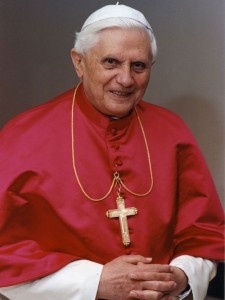
This morning the Holy Father travelled by helicopter from the Apostolic Palace at Castelgandolfo to the Vatican, where he held his weekly general audience in the Paul VI Hall. In his catechesis he dwelt on the first part of Psalm 22, focusing on the theme of prayers of supplication to God.
The Psalm, which remerges in the narrative of Christ’s Passion, presents the figure of an innocent man persecuted and surrounded by adversaries who seek his death. He raises his voice to God “in a doleful lament which, in the certainty of faith, mysteriously gives way to praise”.
The Psalmist’s opening cry of “my God, my God, why have you forsaken me?” is “an appeal addressed to a God Who appears distant, Who does not respond”, said the Holy Father. “God is silent, a silence that rends the Psalmists heart as he continues to cry out incessantly but finds no response”. Nonetheless, he “calls the Lord ‘my’ God, in an extreme act of trust and faith. Despite appearances, the Psalmist cannot believe that his bond with the Lord has been severed entirely”.
The opening lament of Psalm 22 recurs in the Gospels of Matthew and Mark in the cry the dying Jesus makes from the cross. This, Benedict XVI explained, expresses all the desolation the Son of God felt “under the crushing burden of a
mission which had to pass through humiliation and destruction. For this reason He cried out to the Father. … Yet His was not a desperate cry, as the Psalmist’s was”.
Violence dehumanises
Sacred history, the Pope continued, “has been a history of cries for help from the people, and of salvific responses from God”. The Psalmist refers to the faith of his ancestors “who trusted … and were never put to shame”, and he describes his own extreme difficulties in order “to induce the Lord to take pity and intervene, as He always had in the past”.
The Psalmist’s enemies surround him, “they seem invincible, like dangerous ravening beasts. … The images used in the Psalm also serve to underline the fact that when man himself becomes brutal and attacks his fellow man, … he seems to lose all human semblance. Violence always contains some bestial quality, and only the salvific intervention of God can restore man to his humanity”.
At this point, death begins to take hold of the Psalmist. He describes the moment with dramatic images “which we come across again in the narrative of Christ’s Passion: the bodily torment, the unbearable thirst which finds an echo in Jesus’ cry of ‘I am thirsty’, and finally the definitive action of his tormenters who, like the soldiers under the cross, divide among themselves the clothes of the victim, whom they consider to be already dead”.
At this point a new cry emerges, “which rends the heavens because it proclaims a faith, a certainty, that is beyond all doubt. … The Psalm turns into thanksgiving. … The Lord has saved the petitioner and shown him His face of mercy. Death and life came together in an inseparable mystery and life triumphed. … This is the victory of faith, which can transform death into the gift of life, the abyss of suffering into a source of hope”. Thus the Psalm leads us to relive Christ’s Passion and to share the joy of His resurrection.
In closing, the Pope invited the faithful to distinguish deeper reality from outward appearance, even when God is apparently silent. “By placing all our trust and hope in God the Father, we can pray to Him with faith at all moments of anguish, and our cry for help will turn into a hymn of praise”.
AG/ VIS 20110914 (630)
Published by VISarchive 02 – Wednesday, September 14, 2011
Pope Benedict on Prayer 8 – Dialectic of Prayer: Human Cry and Divine Response
DIALECTIC OF PRAYER: HUMAN CRY AND DIVINE RESPONSE
VATICAN CITY, 7 SEP 2011 (VIS) – This morning Benedict XVI travelled by helicopter
from the Apostolic Palace in Castelgandolfo to the Vatican for his weekly general audience in St. Peter’s Square.
Continuing a series of catecheses on the subject of “the school of prayer”, the Holy Father turned his attention to Psalm 3 which recounts David’s flight from Jerusalem when Absalom rose against him. “In the Psalmist’s lament”, the Pope said, “each of us may recognise those feelings of pain and bitterness, accompanied by faith in God, which, according the biblical narrative, David experienced as he fled from his city”.
In the Psalm, the king’s enemies are many and powerful, and the imbalance between David’s forces and those of his persecutors “justifies the urgency of his cry for help”. Nonetheless his adversaries “also seek to break his bond with God and to undermine the faith of their victim by insinuating that the Lord cannot intervene”.
Thus, the aggression “is not only physical, it also has a spiritual dimension” aimed at “the central core of the Psalmist’s being. This is the extreme temptation a believer suffers: the temptation of losing faith and trust in the closeness of God”, the Holy Father said.
Yet, as the Book of Wisdom says, the unrighteous are mistaken because “the Lord … is like a shield protecting those who entrust themselves to Him. He causes them to raise their heads in sign of victory. Man is no longer alone … because the Lord hears the cry of the oppressed. … This intertwining of human cry and divide response is the dialectic of prayer and the key to reading the entire history of salvation. A cry expresses a need for help and appeals to the faithfulness of the other. To cry out is an act of faith in God’s closeness and His willingness to listen. Prayer express the certainty of a divine presence which has already been experienced and believed, and which is fully manifested in the salvific response of God”.
Psalm 3 presents us “a supplication replete with faith and consolation. By praying this Psalm we share the sentiments of the Psalmist: a just but persecuted figure which would later be fulfilled in Jesus. In pain, danger and the bitterness of misunderstanding and offence, the words of this Psalm open our hearts to the comforting certainty of faith. God is always close, even in times of difficulty, problems and darkness. He listens, responds and saves.
“However”, the Pope added, “it is important to be able to recognise His presence and to accept His ways: like David during his humiliating flight from his son Absalom, like the persecuted righteous of the Book of Wisdom and, finally and fully, like the Lord Jesus on Golgotha. In the eyes of the unrighteous it appeared that God did not intervene and that His Son died, but for believers it was at that precise moment that true glory was manifested and definitive salvation achieved”.
The Pope concluded: “May the Lord give us faith, may He come in aid of our weakness and help us to pray in moments of anguish, in the painful nights of doubt and the long days of pain, abandoning ourselves trustingly to Him, our shield and our glory”.
AG/ VIS 20110907 (550)
PSALM 3 From the New Advent On-line Bible:
1 The psalm of David when he fled from the face of his sonAbsalom.
 hy, O Lord, are they multiplied that afflict me? many are they who rise up against me.
hy, O Lord, are they multiplied that afflict me? many are they who rise up against me.
3 Many say to mysoul: There is no salvation for him in his God.
4 But you, O Lord, are my protector, my glory, and the lifter up of my head.
5 I have cried to the Lord with my voice: and he has heard me from his holy hill.
6 I have slept and have taken my rest: and I have risen up, because the Lord has protected me.
7 I will not fear thousands of the people surrounding me: arise, O Lord; save me, O my God.
8 For you have struck all them who are my adversaries without cause: you have broken the teeth of sinners.
9 Salvation is of the Lord: and your blessing is upon your people.
Pope Benedict on Prayer 7: The Psalms: The Book of Prayer Par Excellence
THE PSALMS: THE BOOK OF PRAYER PAR EXCELLENCE
VATICAN CITY, 22 JUN 2011 (VIS) – Benedict XVI dedicated his catechesis during this morning’s general audience to what he described as “the book of prayer par excellence, the Book of Psalms”. The audience was held in St. Peter’s Square in the presence of 10,000 people.
The 150 Psalms of the Book of Psalms “express all human experience“, said the Pope. “All the truth of the believer comes together in those prayers, which first the People of Israel and later the Church adopted as a special way to mediate their relationship with the one God, and as an adequate response to His having revealed Himself in history“.
“Despite the many forms of expression they contain”, the Psalms “can be divided into two broad categories: … supplication associated with lamentation, and praise. These two dimensions are related, almost indivisible, because supplication is animated by the certainty that God will respond, and this opens the way to praise and thanksgiving; while praise and thanksgiving arise from the experience of salvation received, which presupposes the need for help expressed in the supplication. … Thus, in the prayer of the Psalms, supplication and praise intertwine and fuse together in a single song which celebrates the eternal grace of the Lord as He bows down to our frailty”.
“The Psalms teach us to pray”, the Holy Father explained. “In them, the Word of God becomes the word of prayer. … People who pray the Psalms speak to God with the words of God, addressing Him with the words He Himself taught us. … Through these words it is also possible to know and accept the criteria of His actions, to approach the mystery of His thoughts and His ways, so as to grow and develop in faith and love”.
“By teaching us to pray”, the Pope went on, “the Psalms also teach us that at times of desolation, even
in moments of suffering, the presence of God is a source of wonder and consolation. We may weep, plead and seek intercession, … but in the awareness that we are advancing towards the light, where praise will be unending”.
“Equally important and significant are the manner and frequency in which the words of the Psalms appear in the New Testament, where they assume and underline that prophetic significance suggested by the link of the Book of Psalms with the messianic figure of David. In His earthly life the Lord Jesus prayed with the Psalms, and in Him they reach definitive fulfilment and reveal their fullest and deepest meaning. The prayers of the Book of Psalms, with which we speak to God, speak to us of Him, they speak of the Son, image of the invisible God Who fully reveals the Father’s face to us.
Thus Christians, by praying the Psalms, pray to the Father in Christ and with Christ, seeing those songs in a new perspective which has its ultimate interpretation in the Paschal Mystery”.
Having completed his catechesis and delivered greetings in various languages, the Pope recalled the fact that tomorrow is the Feast of Corpus Christi. He invited everyone in Rome, residents and pilgrims alike, to participate in the Mass he will celebrate at 7 p.m. tomorrow in the basilica of St. John Lateran, and in the subsequent procession along Via Merulana to the basilica of St. Mary Major. “I invite you”, he said, “to join this act of profound faith towards the Eucharist, which represents the most precious treasure of the Church and of humankind”.
AG/ VIS 20110622 (590)
For the Psalms On-Line
The more extensive translation:
ZE11062202 – 2011-06-22
Permalink: http://www.zenit.org/article-32912?l=english
ON LEARNING TO PRAY WITH THE PSALMS
Addressing Him “With the Words That He Himself Gives Us”
VATICAN CITY, JUNE 22, 2011 (Zenit.org).- Here is a translation of the Italian-language catechesis Benedict XVI gave today during the general audience held in St. Peter’s Square. The Pope continued with his series of catecheses on prayer, turning today to a consideration of the Book of Psalms.
* * *
Dear brothers and sisters,
In the preceding catecheses, we paused to consider a number of Old Testament figures who are particularly significant for our reflection on prayer. I spoke about Abraham, who intercedes for the foreign cities; about Jacob, who in his nighttime combat receives a blessing; about Moses, who begs for forgiveness for his people; and about Elijah, who prays for the conversion of Israel. With today’s catechesis, I would like to begin down a new path: Rather than commenting on particular accounts of persons at prayer, we will enter into the “prayerbook” par excellence, the Book of Psalms. In the upcoming catecheses we will read and meditate on a number of the most beautiful psalms which are also dearest to the Church’s tradition of prayer. Today I would like to introduce them by speaking about the Book of Psalms as a whole.
The Psalter presents itself as a “formulary” of prayers, a collection of 150 psalms that the biblical tradition gives to the people of believers in order that they may become their — our prayer — our way of addressing God and of relating to Him. In this book, the whole of human experience with its many facets finds expression, along with the entire range of emotions that accompany man’s existence. In the Psalms, joy and suffering, desire for God and the perception of one’s own unworthiness, delight and the sense of abandonment, trust in God and painful solitude, fullness of life and fear of death are all interwoven and expressed. The believer’s whole reality flows into these prayers, which first the people of Israel and then the Church took up as a privileged meditation on the relationship with the one God, and the fitting response to His self-revelation in history.
As prayer, the Psalms are manifestations of the soul and of faith, in which everyone can recognize himself and in which there is communicated that experience of special closeness to God, to which each man is called. And it is the whole complexity of human existence that converges in the complexity of the different literary forms of the various psalms: hymns, lamentations, individual and collective supplication, songs of thanksgiving, penitential psalms, and other genre that are found in these poetic compositions.
Despite this wide range of expression, two great areas can be identified that synthesize the prayer of the Psalter: petition, which is connected with lament, and praise — two interconnected and almost inseparable dimensions. For petition is animated by the certainty that God will respond, and this opens up to praise and thanksgiving; and praise and thanksgiving flow from the experience of salvation received, which assumes the need for the help expressed by the petition.
In petition, the one who prays laments and describes his situation of distress, of danger, of desolation; or, as in the penitential psalms, he confesses guilt and sin, and asks to be forgiven. He lays bare his neediness before the Lord, in the confidence of being heard, and this implies an acknowledgement of God as good, as desirous of the good, and as the “lover of life” (cf. Wisdom 11:26) who is ready to help, save and forgive. Thus, for example, the Psalmist in Psalm 31 prays: “In thee, O Lord, do I seek refuge; let me never be put to shame [ … ] take me out of the net which is hidden for me, for thou art my refuge (verses 2,5 [1,4]). Therefore, already in the lament something of praise may emerge, announcing itself in the hope of divine intervention, and becoming explicit once divine salvation has become a reality.
In an analogous way — in the psalms of thanksgiving and of praise — in remembering the gift received or in contemplating the greatness of God’s mercy, one recognizes one’s own littleness as well as one’s need for salvation, which is at the foundation of petition. In this way, one confesses to God one’s own condition as a creature, inevitably marked as it is by death, and yet the bearer of a radical desire for life. For this reason, in Psalm 86 the Psalmist exclaims: “I give thanks to thee, o Lord my God, with my whole heart, and I will glorify thy name forever. For great is thy steadfast love toward me; thou hast delivered my soul from the depths of Sheol” (verses 12, 13). In this way, in the prayer of the Psalms, petition and praise are interwoven and blend together into one unique song that celebrates the Lord’s eternal grace that bends down to our frailty.The book of the Psalter was given to Israel and to the Church precisely in order that the people of believers might be permitted to unite themselves to this song. The Psalms, in fact, teach us to pray. In them, the Word of God becomes the word of prayer — and they are the Psalmists’ inspired words — which also become the word of the one who prays the Psalms. This is the beauty and the special nature of this biblical book: Unlike other prayers we find in sacred Scripture, the prayers contained [in the Book of Psalms] are not inserted into a narrative story which specifies either their meaning or their function. The Psalms are given to the believer precisely as a text of prayer, which has as its one end that of becoming the prayer of the one who takes them up and, with them, addresses himself to God. Since they are the Word of God, he who prays the Psalms speaks to God with the very words that God has given to us; he addresses Him with the words that He Himself gives us. Thus, in praying the Psalms we learn to pray. They are a school of prayer.
Something analogous happens when a child begins to talk; when he learns, that is, to express his feelings, emotions, and needs with words that do not belong to him naturally, but which he learns from his parents and from those who live around him. What the child wants to express is his own personal experience, but the means of expression belong to others; and little by little he appropriates them — the words received from his parents become his words, and through those words he also learns a way of thinking and feeling; he enters into a whole world of concepts, and in this [world] he grows, relates with reality, with men and with God. At last, the language of his parents becomes his language; he speaks with the words received from others, which by now have become his words.
And so it is with the prayer of the Psalms. They are given to us so that we might learn to address ourselves to God, to communicate with Him, to talk to Him about ourselves with His words, to find language for an encounter with Him. And, through those words, it will also be possible to know and to receive the standards of his way of acting, to approach the mystery of his thoughts and of his ways (cf. Isaiah 55:8-9), so as to grow always more in faith and love. As our words are not only words, but also teach us about a real and conceptual world, so also these prayers teach us about the heart of God, for which reason are we able not only to speak with God, but also to learn who God is and — in learning how to speak with Him — we learn what is it to be man, to be ourselves.
In this regard, the title given to the Psaltery by the Jewish tradition appears significant. It is called Tehellim, an Hebraic term that means “songs of praise,” [which comes] from the root word we find in the expression “Halleluiah” — literally: “praise the Lord.” Thus, even though this prayerbook is so multifaceted and complex — with its various literary genre and with its connection between praise and petition – it is ultimately a book of praise, that teaches us to give thanks, to celebrate the greatness of the gift of God, to acknowledge the beauty of His words and to glorify His holy Name.
This is the most fitting response before God’s self-revelation, and the experience of His goodness. By teaching us to pray, the Psalms teach us that, even in the midst of desolation, in suffering, God’s presence remains and is the source of wonder and of consolation; we can cry, beg, intercede, lament, but [we do so] in the knowledge that we are walking toward the light, where praise can be definitive; “in thy light do we see light” (Psalm 36:10 [9]).
But beyond the book’s general title, the Jewish tradition has also given specific titles to many of the psalms, attributing them in great part to King David. A figure of notable human and theological depth, David is a complex personality who passed through the most varied experiences fundamental to life. A young shepherd of his father’s flock — passing through the ups and downs and at times dramatic events of life — he becomes king of Israel, the shepherd of God’s people. Although a man of peace, he fought many wars; an untiring and tenacious seeker of God, yet he betrayed His love, and this is characteristic: He always remained a seeker of God, even though he sinned gravely many times; a humble penitent, he received divine forgiveness, even divine pity, and he accepted a fate marked by suffering. Thus, in all his weakness, David was a king “after God’s own heart” (cf. 1 Samuel 13:14); that is, a passionate man of prayer, a man who knew what it meant to petition and to praise. The connection of the Psalms with this illustrious king of Israel is important, then, for he is a messianic figure, the Lord’s Anointed, in whom the mystery of Christ is in some way foreshadowed.Just as important and meaningful are the ways and frequency with which the words of the psalms are repeated in the New Testament, taking up and underscoring the prophetic value suggested by the Psalter’s connection with the messianic figure of David. In the Lord Jesus, who during His earthly life prayed with the Psalms, they find their definitive fulfillment and reveal their fullest and most profound meaning. The prayers of the Psalter, with which we speak to God, speak to us of Him, they speak to us of the Son, the image of the invisible God (Colossians 1:15), who fully reveals to us the Face of the Father. The Christian, therefore, in praying the Psalms, prays to the Father in Christ and with Christ, taking up those songs within a new perspective, which finds its ultimate interpretative key in the Paschal mystery. Thus do the horizons of the one who prays open up to unexpected realities — each Psalm acquires a new light in Christ and the Psalter is able to shine in all its infinite richness.
Dearest brothers and sisters, let us take this holy book in hand; let us allow ourselves to be taught by God to address ourselves to Him; let us make the Psalter a guide that helps us and accompanies us daily along the way of prayer. And let us, like Jesus’ disciples, also ask: “Lord, teach us to pray” (Luke 11:1), opening our hearts to receive the Teacher’s prayer, in which all prayers attain their fulfillment. Thus, made sons in the Son, will we be able to speak to God calling Him “Our Father.” Thank you.
[Translation by Diane Montagna]
Pope Benedict on Prayer 6: through prayer God reveals His saving power
T
THE POWER OF INTERCESSION: THE PROPHET ELIJAH’S PRAYER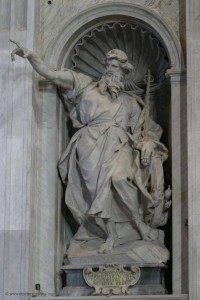
VATICAN CITY, 15 JUN 2011 (VIS) – In his general audience, held this morning in St. Peter’s Square, the Pope resumed his series of catecheses dedicated to the subject of prayer, focusing today on the Prophet Elijah “whom God sent to bring the people to conversion”.
The Holy Father explained how “upon Mount Carmel Elijah revealed himself in all his power as intercessor when, before the whole of Israel, he prayed to the Lord to show Himself and convert people’s hearts. The episode is recounted in chapter 18 of the First Book of Kings”.
“The contest between Elijah and the followers of Baal (which was, in fact, a contest between the Lord of Israel, God of salvation and life, and a mute and ineffective idol which can do nothing for either good or evil) also marked the beginning of a confrontation between two completely different ways to address God and to pray”. The oblations of the prophets of Baal “revealed only the illusory reality of the idol … which closed people in the confines of a desperate search for self”.
On the other hand, Elijah “called on the people to come closer, involving them in his actions and his prayer. … The prophet built an alter using ‘twelve stones, according to the number of the tribes of the sons of Jacob’, … to represent all Israel. … Elijah then addressed the Lord calling Him Lord of the fathers, thus implicitly recalling the divine promises and the history of choice and alliance which had indissolubly united the Lord to His people”.
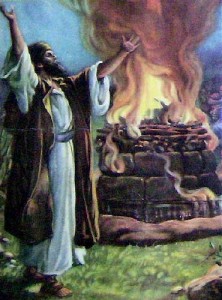 The prophet’s request “was that the people might finally and fully come to know and understand Who their God is, and make the decisive decision to follow only Him. Only in this way could God be recognised as Absolute and Transcendent”. Only in this way would it be clear that “no other gods could be placed at His side, as this would deny His absoluteness and relativize Him”.
The prophet’s request “was that the people might finally and fully come to know and understand Who their God is, and make the decisive decision to follow only Him. Only in this way could God be recognised as Absolute and Transcendent”. Only in this way would it be clear that “no other gods could be placed at His side, as this would deny His absoluteness and relativize Him”.
Benedict XVI highlighted how
“believers must respond to the absoluteness of God with absolute and total love, a love involving all their lives, their energies, their hearts. … In his intercession, Elijah asked of God what God Himself wished to do: to show Himself in all His mercy, faithful to His nature as Lord of life Who forgives, converts and transforms”.
“The Lord responded unequivocally, not only burning the offering but even consuming all the water that had been poured around the altar. Israel could no longer doubt: divine mercy had responded to its weakness, to its doubts, to its lack of faith. Now Baal, the vain idol, was beaten and the people, who seemed lost, had rediscovered the way of truth, they had rediscovered themselves“.
The Holy Father concluded by asking himself what this story has to tell us today.
“Firstly”, he said, “is the priority of the first commandment of God’s Law: having no god but God. When God disappears man falls into slavery, into idolatry, as has happened in our time under totalitarian regimes and with the various forms of nihilism which make man dependent on idols and idolatry, which enslave”. Secondly, he continued, “the main objective of prayer is conversion: the fire of God which transforms our hearts and makes us capable of seeing God and living for Him and for others”. Thirdly, “the Church Fathers tell us that this story is … a foretaste of the future, which is Christ. It is a step on the journey towards Christ”.
AG/ VIS 20110615 (590)
Published by VIS – Holy See Press Office – Wednesday, June 15, 2011
Pope Benedict on Prayer 5: “Moses speaks to God as a friend”
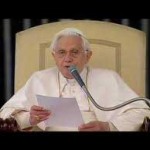 VATICAN CITY, 1 JUN 2011 (VIS) – Benedict XVI dedicated today’s general Wednesday audience catechesis to the figure of Moses who “carried out his function as mediator between God and Israel, making himself the bearer of the divine words and commands for his people, bringing them to the freedom of the Promised Land … and, above all, praying”.
VATICAN CITY, 1 JUN 2011 (VIS) – Benedict XVI dedicated today’s general Wednesday audience catechesis to the figure of Moses who “carried out his function as mediator between God and Israel, making himself the bearer of the divine words and commands for his people, bringing them to the freedom of the Promised Land … and, above all, praying”.
The Pope emphasized that Moses especially acts as intercessor when the people ask Aaron to build the golden calf while they are waiting for the prophet who has ascended Mount Sinai to receive the Tables of the Law. “Tired of following a path with a God who is invisible now that Moses the mediator has also gone, the people demand a tangible, palpable presence of the Lord and find an accessible god, within the reach of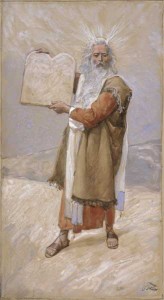 human beings, in Aaron’s molten metal calf. This is a constant temptation on the path of faith: avoiding the divine mystery by building a comprehensible god that corresponds to our own preconceptions and plans”.
human beings, in Aaron’s molten metal calf. This is a constant temptation on the path of faith: avoiding the divine mystery by building a comprehensible god that corresponds to our own preconceptions and plans”.
In the face of the Israelites’ infidelity, God asks Moses to let him destroy that rebel people but Moses understands that those words are directed at him so that the prophet “might intervene and ask him not to do it. … If God were to let his people perish, it could be interpreted as a sign of divine incapacity to fulfill the plan of salvation and God could not allow that: He is the good Lord who salves, the guarantor of life, the God of mercy and forgiveness, of liberation from sin that kills. … Moses had a concrete experience of the God of salvation. He was sent as the mediator of divine liberation and now, with his prayer, he becomes the interpreter of a dual concern, worried for the fate of his people but also worried for the honor due the Lord by the truth of his name. … The love for his brothers and sisters and the love of God are united in his prayer of intercession and are inseparable. Moses, the intercessor, is the man between two loves that, in prayer, are superimpose in one single desire for good”.
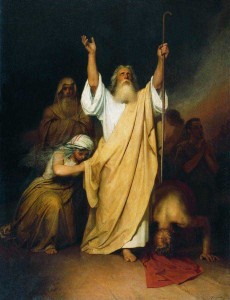 “The intercessor does not make excuses for the sin of his people and does not list the presumed merits of either himself or his people. He appeals to God’s generosity: a free God, completely love, who never ceases to seek those who have drawn away from him. … Moses asks God to show himself even stronger than sin and death and, with his prayer, brings about this divine revelation”.
“The intercessor does not make excuses for the sin of his people and does not list the presumed merits of either himself or his people. He appeals to God’s generosity: a free God, completely love, who never ceases to seek those who have drawn away from him. … Moses asks God to show himself even stronger than sin and death and, with his prayer, brings about this divine revelation”.
“In Moses who is at the top of the mountain – face to face with God, the intercessor of his people – the Fathers of the Church have seen a prefiguration of Christ who, atop the Cross, is truly before God, not just as friend but as Son. … His intercession”, the pontiff concluded, “is not just solidarity but identification with us. … He gives us a forgiveness that transforms and renews. I believe we must meditate on this reality: Christ before God praying for us, identifying with us. From the heights of the Cross he didn’t bring us new stone tablets of the law but himself as Covenant”.
AG/ VIS 20110601 (530)
UPDATED – complete text in English from Vatican.va
BENEDICT XVI
GENERAL AUDIENCE
St. Peter’s Square
Wednesday, 1 June 2011
[Video]
Dear Brothers and Sisters,
As we read the Old Testament we note one figure who stands out from among the others: Moses, precisely, as a man of prayer. Moses, the great prophet and leader at the time of the Exodus, carried out his role as mediator between God and Israel by making himself a messenger to the people of God’s words and divine commands, by leading it towards the freedom of the Promised Land and by teaching the Israelites to live obeying God and trusting in him during their long sojourn in the desert. However, I would say also, and above all, by praying.
Moses prayed for the Pharaoh when God, with the plagues, was endeavouring to convert the Egyptians’ hearts (cf. Ex 8-10); Moses asked the Lord to heal his sister Miriam, afflicted with leprosy (cf. Num 12:9-13); he interceded for the people which had rebelled fearful of what those who had spied out the land would report (cf. Num 14:1-19); he prayed when fire was about to burn down the camp (cf. Num 11:1-2), and when poisonous serpents decimated the people (cf. Num 21:4-9); he addressed the Lord and reacted by protesting when the burden of his mission became too heavy (cf. Num 11:10-15); he saw God and spoke “to him face to face, as a man speaks to his friend” (cf. Ex 24:9-17; 7-23; 34:1-10, 28-35).
And on Sinai, even while the people were asking Aaron to make a golden calf, Moses prayed, explaining with symbols his own role as intercessor. The episode is recounted in chapter 32 of the Book of Exodus and there is a parallel account in chapter 9 of Deuteronomy.
It is this episode on which I would like to reflect in today’s Catechesis and, in particular, on Moses’ prayer which we find in the Exodus narrative. The people of Israel were at the foot of Sinai whereas Moses, on the mountain, was waiting for the gift of the Tables of the Law, fasting for 40 days and 40 nights (cf. Ex 24:18; Dt 9:9). The number 40 has a symbolic value and suggests the totality of the experience, whereas fasting indicates that life comes from God, that it is he who sustains it.
Indeed, the act of eating entails the assumption of the nourishment that keeps us going; hence fasting, giving up all food, in this case acquires a religious significance: it is a way of showing that man does not live by bread alone but by every word that comes from the mouth of the Lord (cf. Deut 8:3). By fasting Moses showed that he was awaiting the gift of the divine Law as a source of life: this Law reveals God’s will and nourishes the human heart, bringing men and women to enter into a covenant with the Most High, who is the source of life, who is life itself.
Yet, while the Lord, on the mountain, was giving the Law to Moses, at the bottom of the mountain the people were violating it. Unable to endure waiting and the absence of their mediator, the Israelites turned to Aaron: “make us gods, who shall go before us; as for this Moses, the man who brought us up out of the land of Egypt, we do not know what has become of him” (Ex 32:11). Weary of the journey with an invisible God, now that Moses, their mediator, had disappeared, the people clamoured for an actual, tangible presence of the Lord, and in the calf of molten metal made by Aaron found a god made accessible, manageable and within human reach.
This is a constant temptation on the journey of faith: to avoid the divine mystery by constructing a comprehensible god who corresponds with one’s own plans, one’s own projects.
What happened on Sinai shows the sheer folly and deceptive vanity of this claim because, as Psalm 106[105] ironically affirms: “they exchanged the glory of God for the image of an ox that eats grass” (v. 20). So it was that the Lord reacted and ordered Moses to come down from the mountain, revealing to him what the people were doing and ending with these words: “now therefore let me alone, that my wrath may burn hot against them and I may consume them; but of you I will make a great nation” (Ex 32:10).
As he had to Abraham with regard to Sodom and Gomorrah, now too God revealed to Moses what his intentions were, almost as though he did not want to act without Moses’ consent (Am 3:7).
He said: “let… my wrath … burn hot”. In fact these words “let… my wrath burn hot” were spoken so that Moses might intervene and ask God not to do it, thereby revealing that what God always wants is salvation.
Just as for the two cities in Abraham’s day, the punishment and destruction — in which God’s anger is expressed as the rejection of evil — demonstrate the gravity of the sin committed; at the same time, the request of the intercessor is intended to show the Lord’s desire for forgiveness. This is God’s salvation which involves mercy, but at the same time also the denunciation of the truth of the sin, of the evil that exists, so that the sinner, having recognized and rejected his sin, may let God forgive and transform him. In this way prayers of intercession make active in the corrupt reality of sinful man divine mercy which finds a voice in the entreaty of the person praying and is made present through him wherever there is a need for salvation.
Moses’ supplication was wholly based on the Lord’s fidelity and grace. He referred first to the history of redemption which God began by bringing Israel out of Egypt and then recalled the ancient promise made to the Fathers. The Lord brought about salvation by freeing his people from slavery in Egypt; so “why”, Moses asked, “should the Egyptians say, ‘With evil intent did he bring them forth, to slay them in the mountains, and to consume them from the face of the earth?’” (Ex 32:12).
Once the work of salvation has been begun it must be brought to completion; were God to let his people perish, this might be interpreted as a sign of God’s inability to bring the project of salvation to completion. God cannot allow this: he is the good Lord who saves, the guarantor of life, he is the God of mercy and forgiveness, of deliverance from sin that kills.
Hence Moses appealed to God, to the interior life of God against the exterior judgement. But, Moses then argued with the Lord, were his Chosen People to perish, even though guilty, God might appear incapable of overcoming sin. And this he could not accept.
Moses had a concrete experience of the God of salvation; he was sent as a mediator of divine liberation and then, with his prayers; he made himself the interpreter of a twofold anxiety; he was worried about his people’s future and at the same time he was also worried about the honour due to the Lord, about the truth of his name. In fact the intercessor wanted the People of Israel to be saved because this people was the flock which had been entrusted to him, but also because it was in this salvation that the true reality of God was manifest.
The prayer of intercession is permeated by love of the brethren and love of God, they are inseparable. Moses, the intercessor, is the man torn between two loves that overlap in prayer in a single desire for good.
Moses then appealed to God’s faithfulness, reminding him of his promises: “Remember Abraham, Isaac, and Israel, your servants, to whom you swore by your own self, and said… ‘I will multiply your descendants as the stars of heaven, and all this land [of which I have spoken] I will give to your descendants, and they shall inherit it for ever” (Ex 32:13). Moses recalls the founding story of the origins, of the Fathers of the people and of their being totally freely chosen, a choice in which God alone took the initiative. Not for their own merits did they receive the promise, but because of God’s free choice and his love (cf. Deut 10:15).
And Moses then asked the Lord to continue in fidelity his record of choosing and salvation, by forgiving his people. The intercessor did not ask for his people to be excused of their sin, he did not list any presumed merits, either the people’s or his own, but appealed to God’s bounty: a free God, total love, who does not cease to seek out those who have fallen away, who is always faithful to himself, who offers the sinner a chance to return to him and, through forgiveness, to become righteous and capable of fidelity. Moses asked God to show himself more powerful than sin and death, and with his prayer elicited this divine revelation of himself.
As a mediator of life, the intercessor showed solidarity with the people: anxious solely for the salvation that God himself desires, he gave up the prospect of it becoming a new people pleasing to the Lord. The sentence that God had addressed to him, “of you I will make a great nation”, was not even taken into consideration by the “friend” of God, who, instead, was ready to take upon himself not only the guilt of his people, but also all its consequences.
When, after the destruction of the golden calf, he returned to the mountain to ask salvation for Israel once again, he was to say to the Lord: “But now, if you will, forgive their sin — and if not, blot me, I pray you, out of your book which you have written” (Ex 32:32).
With prayer, wanting what God wanted, the intercessor entered more and more deeply into knowledge of the Lord and of his mercy, and became capable of a love that extended even to the total gift of himself. In Moses, on the summit of the mountain face to face with God, who made himself an intercessor for his people and offered himself — “blot me out” — the Fathers of the Church saw a prefiguration of Christ who from the very top of the Cross was truly before God, not only as a friend but as Son. And not only did he offer himself — “blot me out” — but with his pierced heart he had himself blotted out, he himself became sin, as St Paul himself says, he tookupon himself our sins to ensure our salvation. His intercession was not only solidarity but identification with us: he bears all of us in his Body. And thus his whole life as a man and as Son is a cry to God’s heart, it is forgiveness, but forgiveness that transforms and renews.
I think we should meditate upon this reality. Christ stands before God and is praying for me. His prayer on the Cross is contemporary with all human beings, contemporary with me. He prays for me, he suffered and suffers for me, he identified himself with me, taking our body and the human soul. And he asks us to enter this identity of his, making ourselves one body, one spirit with him because from the summit of the Cross he brought not new laws, tablets of stone, but himself, his Body and his Blood, as the New Covenant. Thus he brings us kinship with him, he makes us one body with him, identifies us with him. He invites us to enter into this identification, to be united with him in our wish to be one body, one spirit with him. Let us pray the Lord that this identification may transform and renew us, because forgiveness is renewal and transformation.
I would like to end this Catechesis with the Apostle Paul’s words to the Christians of Rome: “Who shall bring any charge against God’s elect? It is God who justifies; who is to condemn? It is Christ Jesus, who died, yes, who was raised from the dead, who is at the right hand of God, who indeed intercedes for us. Who shall separate us from the love of Christ?… neither death, nor life, nor angels, nor principalities… nor anything else in all creation, will be able to separate us from the love of God, [which is] in Christ Jesus our Lord” (Rom 8:33-35, 38, 39).
Pope Benedict on Prayer 4: Prayer is a struggle that requires strength and tenacity
For Complete Updated Text in English click here
VATICAN CITY, 25 MAY 2011 (VIS) – Continuing with his catecheses on prayer, Benedict XVI spoke in today’s general audience about the Patriarch Jacob and his fight with the unknown man at the ford of the Jabbok. The audience was held in St. Peter’s Square with 15,000 people in attendance.
The Bible, explained the Pope, describes Jacob as an astute man who obtains things through deception. At a certain point, he sets out to return to his homeland and face his brother, whose firstborn birthrights he had taken. Jacob waits overnight in order to cross the ford safely but something unforeseen occurs: he is suddenly attacked by an unknown man with whom he struggles the entire night. The story details their struggle, which has no clear winner, leaving the rival a mystery. “Only at the end, when the struggle is finished and that ‘someone’ has disappeared, only then will Jacob name him and be able to say that he had struggled with God”.
Once the fight is over Jacob says to his opponent that he will only let him go if he blesses him. Jacob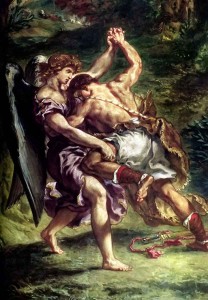 “who had defrauded his brother out of the first-born’s blessing through deceit, now demands [a blessing] from the unknown man, in whom he perhaps begins to see divine traits, but still without being able to truly recognize him. His rival, who seems restrained and therefore defeated by Jacob, instead of bowing to the Patriarch’s request, asks his name. … In the Biblical mentality, knowing someone’s name entails a type of power because it contains the person’s deepest reality, revealing their secret and their destiny. … This is why, when Jacob reveals his name, he is putting himself in his opponent’s hands. It is a form of surrender, a complete giving over of himself to the other”.
“who had defrauded his brother out of the first-born’s blessing through deceit, now demands [a blessing] from the unknown man, in whom he perhaps begins to see divine traits, but still without being able to truly recognize him. His rival, who seems restrained and therefore defeated by Jacob, instead of bowing to the Patriarch’s request, asks his name. … In the Biblical mentality, knowing someone’s name entails a type of power because it contains the person’s deepest reality, revealing their secret and their destiny. … This is why, when Jacob reveals his name, he is putting himself in his opponent’s hands. It is a form of surrender, a complete giving over of himself to the other”.
Paradoxically, however, “in this gesture of surrender, Jacob also becomes the victor because he receives a new name, together with the recognition of his victory on the part of his adversary”. The name “Jacob”, Benedict XVI continued, “recalls the verb ‘to deceive’ or ‘to supplant’. After the struggle, in a gesture of deliverance and surrender, the Patriarch reveals his reality as a deceiver, a usurper, to his opponent. The other, who is God, however, transforms this negative reality into a positive one. Jacob the deceiver becomes Israel. He is given a new name as a sign of his new identity … the mostly likely meaning of which is ‘God is strong, God wins’. When, in turn, Jacob asks his rival’s name, he refuses to say it but reveals himself in an unmistakable 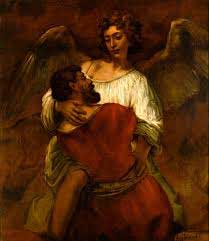 gesture, giving his blessing. … This is not a blessing obtained through deceit but one given freely by God, which Jacob can now receive because, without cunning or deception, he gives himself over unarmed, accepts surrender and admits the truth about himself”.
gesture, giving his blessing. … This is not a blessing obtained through deceit but one given freely by God, which Jacob can now receive because, without cunning or deception, he gives himself over unarmed, accepts surrender and admits the truth about himself”.
In the episode of the fight at the ford of Jabbok, the Pope observed, “the people of Israel speak of their origin and outline the features of a unique relationship between God and humanity. This is why, as also affirmed in the Catechism of the Catholic Church, ‘from this account, the spiritual tradition of the Church has retained the symbol of prayer as a battle of faith and as the triumph of perseverance'”.
“Our entire lives”, concluded the Holy Father, “are like this long night of struggle and prayer, passed in the desire of and request for God’s blessing, which cannot be ripped away or won over through our strength, but must be received with humility from Him as a gratuitous gift that allows us, finally, to recognize the face of the Lord. And when this happens, our entire reality changes: we receive a new name and God’s blessing”.
AG/ VIS 20110525 (620)
updated…the complete text in English from Vatican.va:
top
BENEDICT XVI
GENERAL AUDIENCE
St. Peter’s Square
Wednesday, 25 May 2011
[Video]
Dear Brothers and Sisters,
Today I would like to reflect with you on a text from the Book of Genesis which recounts a rather curious incident in the narrative of the Patriarch Jacob. It is a passage that is not easy to interpret, but it is important for our life of faith and prayer; we are talking about the story of his struggle with God at the ford of the Jabbok, a portion of which we just heard.
As you will recall, Jacob had deprived his twin brother Esau of his birthright in exchange for a dish of lentils and then, by trickery, managed to receive the blessing from his father Isaac, now very elderly, taking advantage of the latter’s blindness. Having fled from Esau’s wrath, he took refuge with one of his relatives, Laban; he married, acquired some wealth, and was returning to his homeland, ready to face his brother having first put into place some prudent provisions. However, when everything was ready for this meeting, after having had those who were with him cross the ford of the stream that marked the boundary of Esau’s territory, Jacob, who had remained behind alone, was suddenly set upon by an unknown man with whom he wrestled the whole night. This hand-to-hand combat, which we find described in chapter 32 of the Book of Genesis, became for him a singular experience of God.
Night is the favourable time for acting secretly, the best time, therefore, for Jacob to enter his brother’s territory unseen, perhaps thinking to take Esau by surprise. It is he, however, who is surprised by an unforeseen attack, one for which he was unprepared. Having used his cleverness to try to escape a dangerous situation, he thought he had managed to have everything under control; instead he now finds himself forced to enter a mysterious struggle that catches him alone and gives him no opportunity to organize a proper defence. Unarmed, in the night, the Patriarch Jacob wrestles with someone. The text does not specify the identity of the aggressor; it uses a Hebrew word that indicates “a man” in a generic sense, “one, someone”; it is, therefore, a vague, indeterminate definition that purposely keeps the assailant shrouded in mystery. It is dark, Jacob does not manage to see his opponent clearly, and even for the reader, for us, he remains anonymous; someone is opposing the Patriarch, and this is the only certain data supplied by the narrator. Only at the end, when the wrestling is over and that “someone” will have disappeared, only then will Jacob name him and be able to say that he had wrestled with God.
The episode, therefore, takes place in darkness and it is difficult to ascertain not only the identity of Jacob’s assailant, but also how the struggle is going. On reading the passage, it is rather difficult to determine which of the two contenders is gaining the upper hand; the verbs used often lack a specific subject, and the actions take place almost in a contradictory manner, so that when it looks as though one of the two is winning, the next action immediately denies that and shows the other to be the victor. At the beginning, in fact, Jacob seems to be the stronger and of his opponent, the text says, “he did not prevail over him” (v. 25); yet he strikes Jacob’s hip at its socket, dislocating it. Thus one thinks that Jacob would have to give in, but instead it is his opponent who asks him to release him; and the Patriarch refuses, setting one condition: “I will not let you go, unless you bless me” (v. 27). The one who tricked his brother and robbed him of the blessing of the firstborn now claims it from the stranger, thus perhaps beginning to perceive some kind of divine meaning, but without yet being able to recognize it for certain.
His rival, who seems to be held back and therefore defeated by Jacob, rather than giving in to the Patriarch’s request, asks him his name: “What is your name?”. And the Patriarch replies: “Jacob” (v. 28). Here the struggle takes an important turn. In fact, knowing someone’s name implies a kind of power over that person because in the biblical mentality the name contains the most profound reality of the individual, it reveals the person’s secret and destiny. Knowing one’s name therefore means knowing the truth about the other person and this allows one to dominate him. When, therefore, in answer to the unknown person’s request Jacob discloses his own name, he is placing himself in the hands of his opponent; it is a form of surrender, a total handing over of self to the other.
However, in this act of surrender paradoxically Jacob too emerges victorious because he receives a new name with the recognition of his victory by his adversary, who says to him: “You shall no longer be spoken of as Jacob, but as Israel, because you have contended with divine and human beings and have prevailed” (v. 29). “Jacob” was a name that recalled the Patriarch’s problematic beginnings; in Hebrew, in fact, it recalls the term “heel” and takes the reader back to the time of Jacob’s birth when, as he left his mother’s womb, he held onto the heel of his twin brother (cf. Gen 25:26), almost prefiguring the unfair advantage he would take over his brother in adulthood; however the name Jacob also recalls the verb “to deceive, to supplant”. Well, now, in the struggle in this act of surrender and submission, the Patriarch reveals his true identity as a deceiver, the one who supplants; however the other, who is God, transforms this negative reality into something positive: Jacob the deceiver becomes Israel, he is given a new name as a sign of a new identity. Here, too, the account maintains its deliberate duplicity because the more probable meaning of the name Israel is “God is strong, God is victorious”.
Therefore Jacob has prevailed, he won — his adversary himself says so — but his new identity, which he has received from the adversary himself, affirms and bears witness to God’s victory. And when Jacob in turn asks his opponent his name, the latter refuses to say it, but reveals himself in an unequivocal gesture, giving him the blessing. The blessing that the Patriarch had requested at the beginning of the struggle is now granted him. However, it is not a blessing obtained through deceit, but one given freely by God, which Jacob can receive because he is now alone, without protection, without cunning or tricks; he gives himself over unarmed, agrees to surrender and confesses the truth about himself. Therefore, at the end of the struggle, having received the blessing, the Patriarch can finally recognize the other, the God of blessings: Truly, he says, “I have seen God face to face, and yet my life is preserved” (v. 30), and now he can cross the ford, the bearer of a new name but “conquered” by God and marked forever, limping because of the injury he received (v. 31).
Biblical exegetes give many interpretations to this passage; the scholars in particular recognize in it literary connotations and components of various genres, as well as references to some popular accounts. But when these elements are taken up by the authors of the Sacred texts and incorporated into the biblical narrative, they change their meaning and the text opens up to broader dimensions. For the believer the episode of the struggle at the Jabbok thus becomes a paradigm in which the people of Israel speak of their own origins and outline the features of a particular relationship between God and humanity. Therefore, as is also affirmed in the Catechism of the Catholic Church, “from this account, the spiritual tradition of the Church has retained the symbol of prayer as a battle of faith and as the triumph of perseverance” (n. 2573). The Bible text speaks to us about a long night of seeking God, of the struggle to learn his name and see his face; it is the night of prayer that, with tenacity and perseverance, asks God for a blessing and a new name, a new reality that is the fruit of conversion and forgiveness.
For the believer Jacob’s night at the ford of the Jabbok thus becomes a reference point for understanding the relationship with God that finds in prayer its greatest expression. Prayer requires trust, nearness, almost a hand-to-hand contact that is symbolic not of a God who is an enemy, an adversary, but a Lord of blessing who always remains mysterious, who seems beyond reach. Therefore the author of the Sacred text uses the symbol of the struggle, which implies a strength of spirit, perseverance, tenacity in obtaining what is desired. And if the object of one’s desire is a relationship with God, his blessing and love, then the struggle cannot fail but ends in that self-giving to God, in recognition of one’s own weakness, which is overcome only by giving oneself over into God’s merciful hands.
Dear brothers and sisters, our entire lives are like this long night of struggle and prayer, spent in desiring and asking for God’s blessing, which cannot be grabbed or won through our own strength but must be received with humility from him as a gratuitous gift that ultimately allows us to recognize the Lord’s face. And when this happens, our entire reality changes; we receive a new name and God’s blessing. And, what is more: Jacob, who receives a new name, and becomes Israel, also gives a new name to the place where he wrestled with God, where he prayed; he renames it Penuel, which means: “The Face of God”. With this name he recognizes that this place is filled with the Lord’s presence, making that land sacred and thus leaving a memorial of that mysterious encounter with God. Whoever allows himself to be blessed by God, who abandons himself to God, who permits himself to be transformed by God, renders a blessing to the world. May the Lord help us to fight the good fight of the faith (cf. 1 Tim 6:12; 2 Tim 4:7) and to ask, in prayer, for his blessing, that he may renew us in the expectation of beholding his Face. Thank you.
top

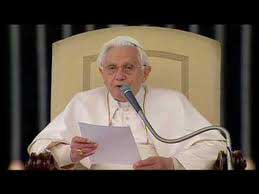

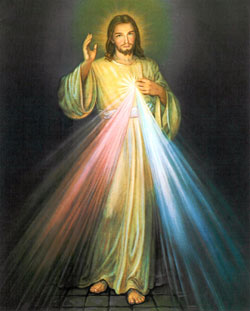
 raise the
raise the 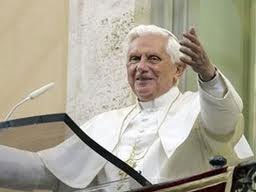


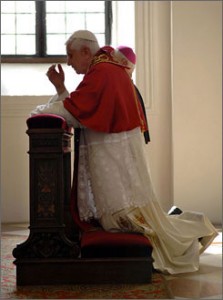
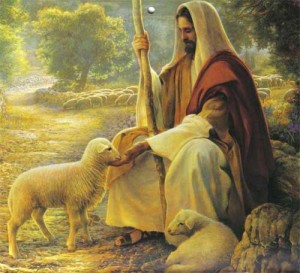
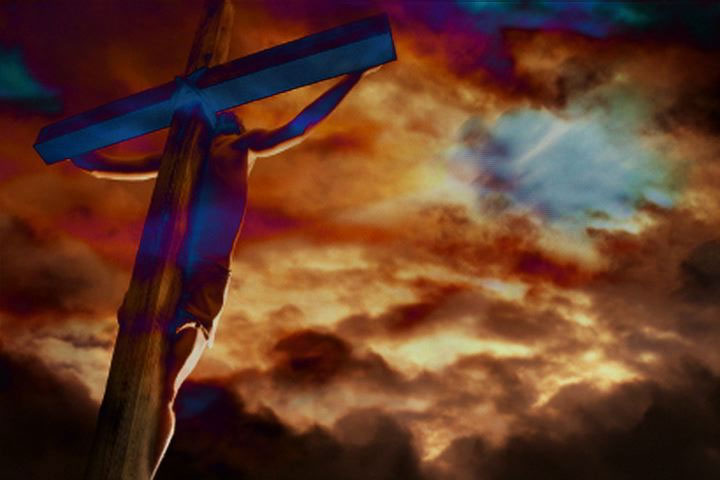


 hy, O
hy, O 